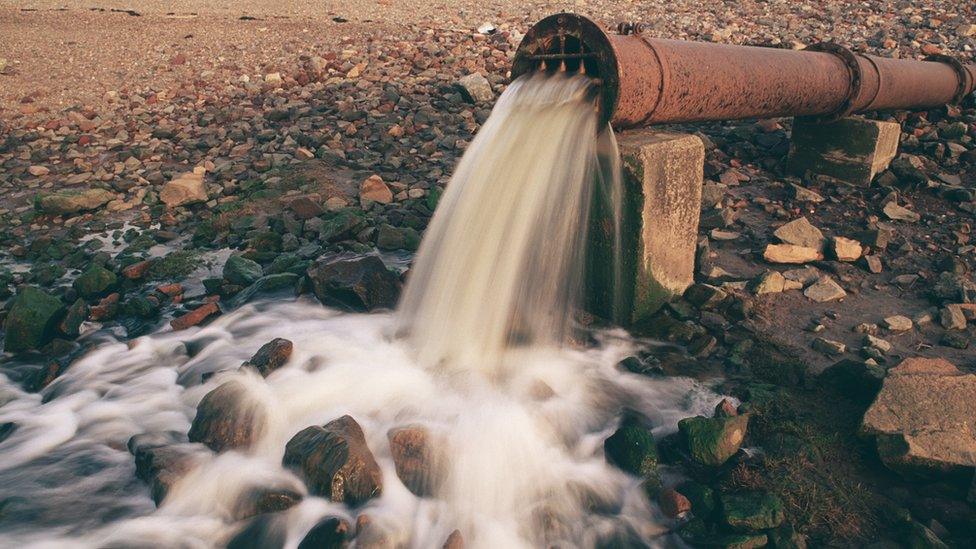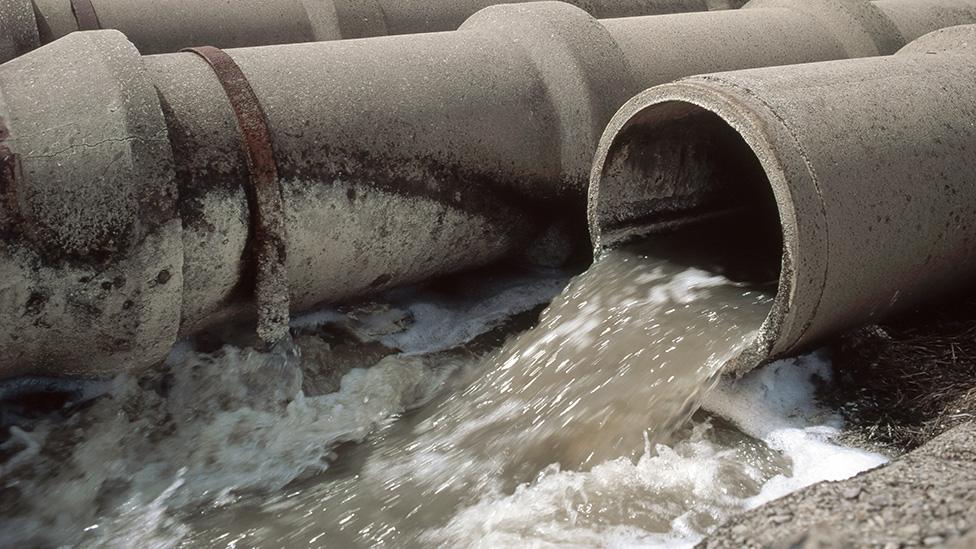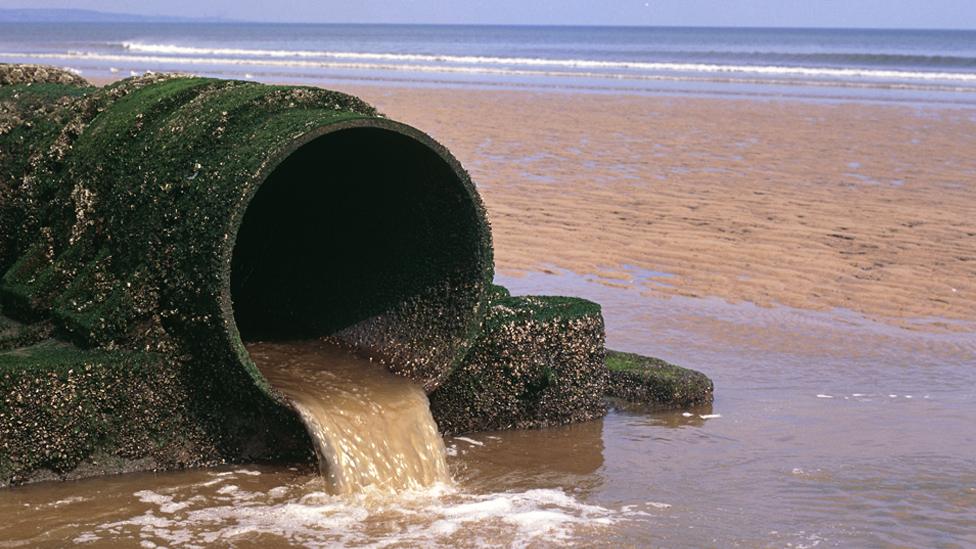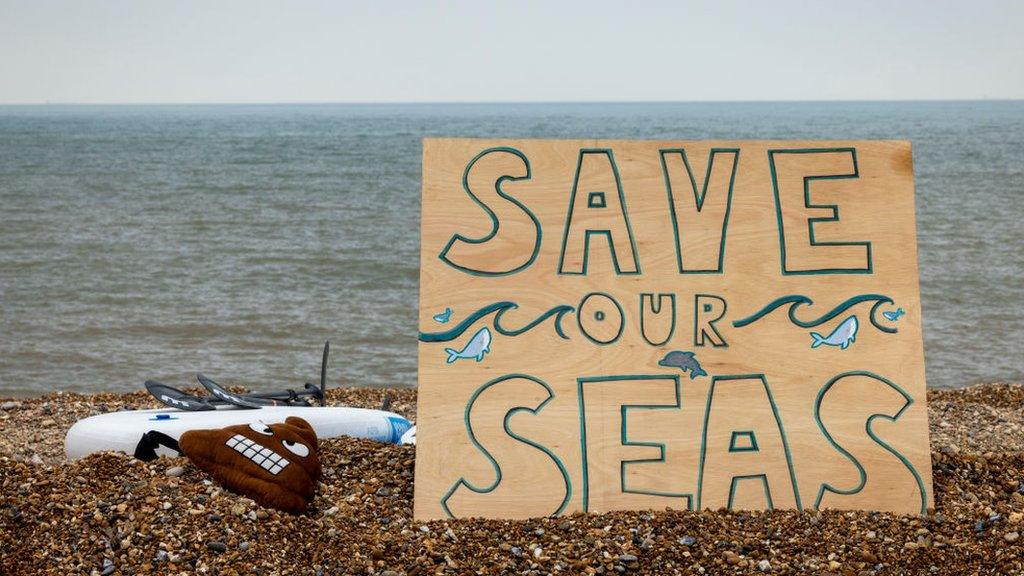Water firms covering up scale of sewage spills, say Lib Dems
- Published

Water firms in England and Wales are not revealing how much sewage is being pumped into rivers, lakes and coastlines, the Liberal Democrats say.
The party says all 10 water and sewerage companies failed to disclose how much sewage had been discharged, in response to its requests for the data.
This could amount to a "scandalous cover-up", it argued.
Industry body Water UK called the claim "fabricated and completely false", saying firms were fixing the problem.
A spokesperson said water companies were investing billions of pounds in deploying around 50,000 monitors across overflows and in rivers, and publishing measurements of spills, oxygen levels and different pollutants almost in real time.
"Only a tiny handful of monitors record volume. We could expand this, but bills would go up to pay for it.
"We would prefer to get on and actually fix the problem rather than delaying progress by installing ever more monitors that would tell us nothing whatsoever about actual impact," the spokesperson added.
Earlier on Wednesday, it emerged that the UK's six largest water firms were facing legal action over claims they under-reported pollution and overcharged customers.
Water UK dismissed the allegations as "entirely without merit", saying customer bills were already adjusted when sewage commitments were not met.
The Lib Dems said it was "staggering" that companies revealed only how long sewage discharges lasted, not the number of litres released into rivers and seas.
This information was essential for understanding the environmental impact of such incidents, the party argued.
There was already public "outrage at water companies destroying the environment with sewage discharges", a spokesperson added.
The Lib Dems said they had tried to establish the volume of pollution through Environment Information Requests - similar to freedom of information requests - but were told the data did not exist, external.
Last year, a parliamentary committee found that more than two billion litres of raw sewage had been dumped into the River Thames over two days in 2020 following a storm.
Despite this, Thames Water told the Lib Dems it "does not record the volume of wastewater discharged into the environment via storm overflows".
Thames Water told the BBC its current monitoring equipment could not measure volumes and was not designed to do so. What mattered most, it said, was stopping the need for spills, and it had recently published improvement plans for more than 250 sites.
Other companies across England and Wales said the monitors they used measured only the frequency and duration of spills, not volume.
Bills warning
Scottish Water, which is publicly owned, does record and publish data on the volume of sewage discharged, but only a small proportion of these storm overflows are monitored.
In Northern Ireland, discharges are not routinely monitored and the last time such information was released was in late 2021.
Water UK said companies were instructed to measure the environmental impact of spills by monitoring their frequency and duration - and had already installed these monitors in 90% of storm overflows.
Modelling discharge volumes would not add anything useful and requiring volume monitors would cost billions of pounds which would be paid for by customers, it warned.
The Lib Dems said the industry in England and Wales was either not telling the truth about holding volume data or the monitors installed were inadequate.
Its previous requests for information had found nearly a quarter of monitors were faulty or had not been fitted throughout 2021 and 2022, the party added.
Lib Dem environment spokesman Tim Farron said: "These water firms could be guilty of a scandalous cover-up.
'Get tougher'
"We have no idea how many billions of litres of sewage are being pumped into our precious rivers and lakes.
"The true extent of environmental damage caused by this scandal is completely unknown. We don't even know how much sewage is being pumped into bathing areas and shellfish water."
In June, an investigation by the Marine Conservation Society, external found that around 6,000 emergency overflows - separate from the storm overflows water companies typically monitor - were not being recorded.
Emergency overflows are supposed to be used only in critical situations, such as if there is an electrical failure at a pumping station.
But more than 90% are not monitored for volume, duration or frequency. Companies are required to monitor only those that have the potential to discharge into shellfish waters.
Mr Farron said: "Ministers need to get tougher on these water firms by demanding they fit proper sewage monitors which are up to the job.
"The government is letting water firms get away with faulty and flawed monitors."
In March, the Environment Agency reported that water companies had released raw sewage into rivers and seas in England for more than 1.75 million hours in 2022 - averaging 825 spills per day.
Related topics
- Published9 August 2023

- Published24 April 2023

